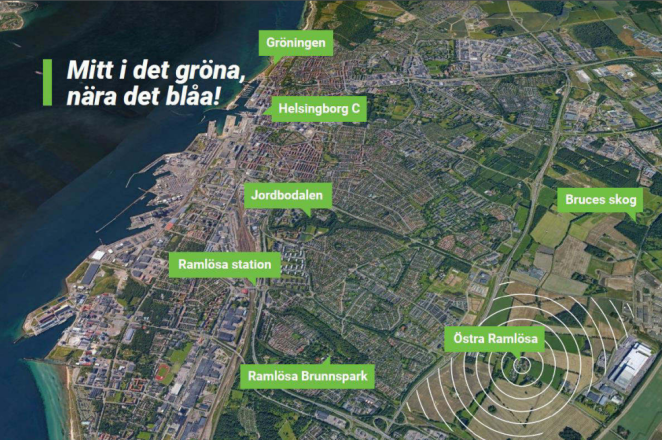From the 17th until the 19th of October, all project partners came together to discuss our projects and brainstorm on the future of the SHARE-North Squared project. As innovators, it was only fitting that our meeting was held in the Swedish city of Helsingborg. A city known for its innovation, getting second place in the European Capital of Innovation Awards 2020, and one of the project partners. The schedule was filled with lots of knowledge exchange, exciting workshops, an instructive site visit, and a public event.

Two Exciting Workshops
One workshop on “Guidelines for Housing Developers on Integrating Shared Mobility” led by Clara Mafé (Housing Europe) and Esther De Reys (autodelen.net). Jurgen Mommerency from Woonmaatschappij Rivierenland (Woonland) and Ellika Rosendahl from Helsingborgshem also shared their first-hand insights.
One Living Lab workshop on “Mobility Solutions in the new area Östra Ramlösa: ‘Sweden’s best neighborhood for families with children’” in which Mattias Rundberg from the City of Helsingborg invited all partners to discuss and contribute to the traffic and mobility plan for Östra Ramlösa.
Östra Ramlösa is a greenfield development site situated 5 kilometers east of Helsingborg’s city center. The new development has an ambitious mobility plan that wants to minimize car traffic. A focal point of the plan is the integration of three mobility houses.
A few lessons were learned:
✔️NEED FOR: A focus on appropriate legislation such as minimizing required car parking and upscaling as well as financing of mobility management measures.
✔️NEED FOR: A focus on educating and de-stigmatizing mobility issues among housing developers.
✔️NEED FOR: A behavioral shift of (new) tenants.
A few new questions were raised:
❔What services and features should the mobility houses contain to encourage sustainable mobility and simplify everyday life for families?
❔What services and features should be located outside of the mobility houses (i.e., in mobility hubs around the neighborhood)?
❔How do we create a feeling of safety in the mobility houses?
❔How can we promote sustainable mobility to the residents & visitors?
❔How can the mobility hubs contribute towards a net-zero energy district (CO2-neutral district/neighborhood)?

A Site Visit to Drottninghög
Jenni Wehrmann and Ellika Rosendahl from Helsingborgshem, a housing company and the property owner, first held an introductory presentation on the development of Drottninghög as part of the Million Housing Development scheme in Sweden in the 1960s and 1970s.
Like many of these mono-functional big-scale housing developments of that time in Europe, Drottninghög underwent significant sociodemographic changes and challenges in the following decades.
The district is now being developed and transformed through the DrottningH project – an initiative that will run for at least twenty years with a focus on environmental, social, and economic sustainability.
Four distinctive goals have been set. The aim is to create an open process and collaboration, make connections and break down barriers, densify the district and create variation, and focus efforts on children and young people.
You can find more information about the project here.
